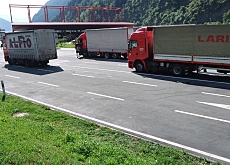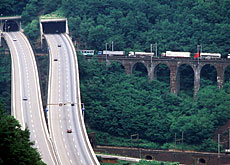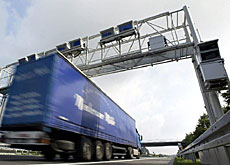Plan to reduce alpine traffic gets thumbs-up

Switzerland could reduce the volume of heavy goods traffic crossing the Alps by introducing a new system of auctioning transit rights, experts say.
The authors of a report commissioned by the transport ministry said that an “alpine transit exchange” was technically and economically feasible. The final decision lies with the government.
The idea has the backing of the Alpine Initiative, an association set up to protect and preserve the alpine region.
The aim is to reach the government goal of reducing heavy vehicle crossings of the Alps to 650,000 by 2009. In 2003, there were over one million alpine crossings by heavy goods trucks.
Transport Minister Moritz Leuenberger is also considering additional measures to achieve the reduction called for by Swiss law, notably cheaper rail tariffs, an increase in heavy goods vehicle tax, and tunnel charges.
Two models
The report was drawn up by two independent firms, Rapptrans and Ecoplan, and presented on Thursday. The transport ministry said the experts considered two different models for auctioning transit rights.
Under the first model, known as “Cap and Trade”, a quota of crossing rights would be made available to haulage companies. These carriers would later be entitled to trade the permits among themselves, buying or selling as required.
A maximum of 650,000 permits would be available every year, costing an estimated SFr200 ($164) each.
“This model would make road transport more expensive and would therefore result in more goods traffic switching to the railways,” the report said.
Under the second variant, known as the “slot” system, hauliers would be able to reserve crossing rights at a particular time. Trucks without a reservation would have to wait for permission to cross.
The price of permits would be decided by the market and could be higher during peak times, the experts said. They said that an advantage of this system was that it would allow more efficient use of roads capacity and reduce traffic jams.
Both systems are technically feasible and economically sustainable, the experts added. But they said the second model would necessitate negotiations with the European Union over changes to a recently adopted transport agreement.
“Relief”
The Alpine Initiative said the introduction of a transit exchange would benefit the economy and people living along the transit routes. Carriers could plan their transport well in advance and calculate their costs.
Traffic jams caused by heavy goods vehicles would be eliminated and the limitation of transalpine trips would ensure the traffic system was not overloaded, it said.
“If the alpine crossing exchange is adopted, people living along the transit routes can breathe a sigh of relief,” the Alpine Initiative said in a statement.
“The number of trips will be limited to the number that is bearable for the population and the environment. Hauliers will therefore make sure they don’t make trips with empty trucks. Unnecessary journeys will be eliminated.”
The Alpine Initiative added that the need to buy permits added to other transport costs would “largely wipe out” the existing price advantage that road transport has over rail.
The alpine transit exchange could be included in a new transport law which is expected to be put out for consultation in the autumn.
swissinfo with agencies
In 2003, 1.3 million trucks crossed the Swiss Alps.
The current traffic law states that by 2009 only half as many crossings (650,000) will be permitted.
An existing tax on heavy goods vehicles is aimed at moving freight from the roads onto the rails.
In autumn the government will put a new transport law out for consultation.
The new law could include plans for an alpine crossing exchange or reservation system.

In compliance with the JTI standards
More: SWI swissinfo.ch certified by the Journalism Trust Initiative


You can find an overview of ongoing debates with our journalists here. Please join us!
If you want to start a conversation about a topic raised in this article or want to report factual errors, email us at english@swissinfo.ch.